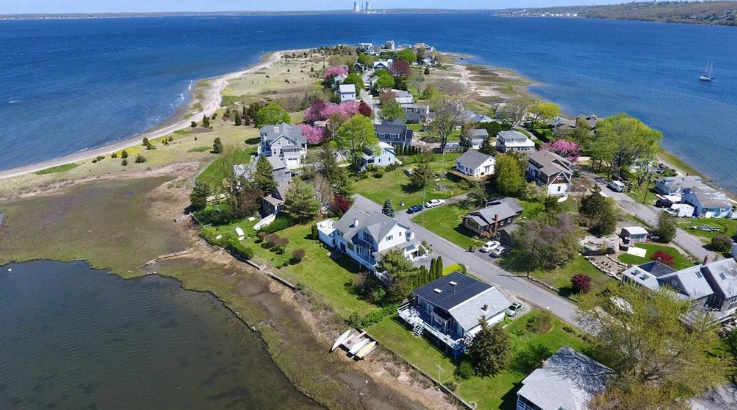Not even a pandemic could dampen recent efforts of partners participating in a project to engage the community of Common Fence Point, in Portsmouth, RI, in resiliency building.
“We feel it is vitally important that we provide accurate information to the community regarding events that may impact the neighborhood, says Jim Fogerty, Common Fence Point resident and Chairman of the neighborhood’s Preparedness Committee. “We want to provide opportunities for residents to get involved in helping to preserve our coastline for the enjoyment of everyone.”
Fogerty is among the Common Fence Point neighbors working with CRC, State and municipal leaders and emergency management officials, and scientists to help the neighborhood protect itself from flooding tied to strong storms and sea level rise.
Pam Rubinoff is a CRC coastal manager and resiliency specialist guiding the project team. She says that the ongoing pandemic, while difficult, has presented the project with the opportunity to be mindful of the many layers of resiliency. “At the start of this effort, we thought about resiliency primarily as a public safety response to coastal flooding and erosion,” she says, “but the pandemic reminds us that there are other qualities pertaining to resilience – such as public health and wellbeing.”
With the support of Rhode Island Sea Grant – Rubinoff serves as an extension agent for the program which is also housed at the University of Rhode Island Graduate School of Oceanography – Prince Charitable Trusts, and the van Beuren Charitable Foundation, a donor for a variety of Aquidneck Island enhancement programs, the project has gained considerable traction.
Underway for about a year, the project is overseen by the preparedness committee and has provided several opportunities for community members to take part in resiliency building activities. The activities familiarize people with the basic science of climate change and encourage them to flex their collective muscle in thinking through steps to make Common Fence Point safer from flooding. Activities have included webinars or telemeetings on key issues, such as neighborhood evacuation procedures, a virtual tour of flood sites featuring technical assistance from experts, and a program to help families build their own emergency kits.
Rubinoff says that the project is ensuring that Common Fence Point uses sound science to make smart choices as a group about how to protect people and property for years to come. Already, other Aquidneck Island neighborhoods, such as Island Park, have expressed interest in undertaking a similar project. “This is an opportunity not only for Common Fence Point to engage in resiliency building, but for it to show other coastal communities, in Rhode Island and elsewhere, what is possible in terms of adaptation – even during a challenging pandemic,” says Rubinoff.
For more information about CRC’s resiliency work, visit https://prep-ri.org/.

